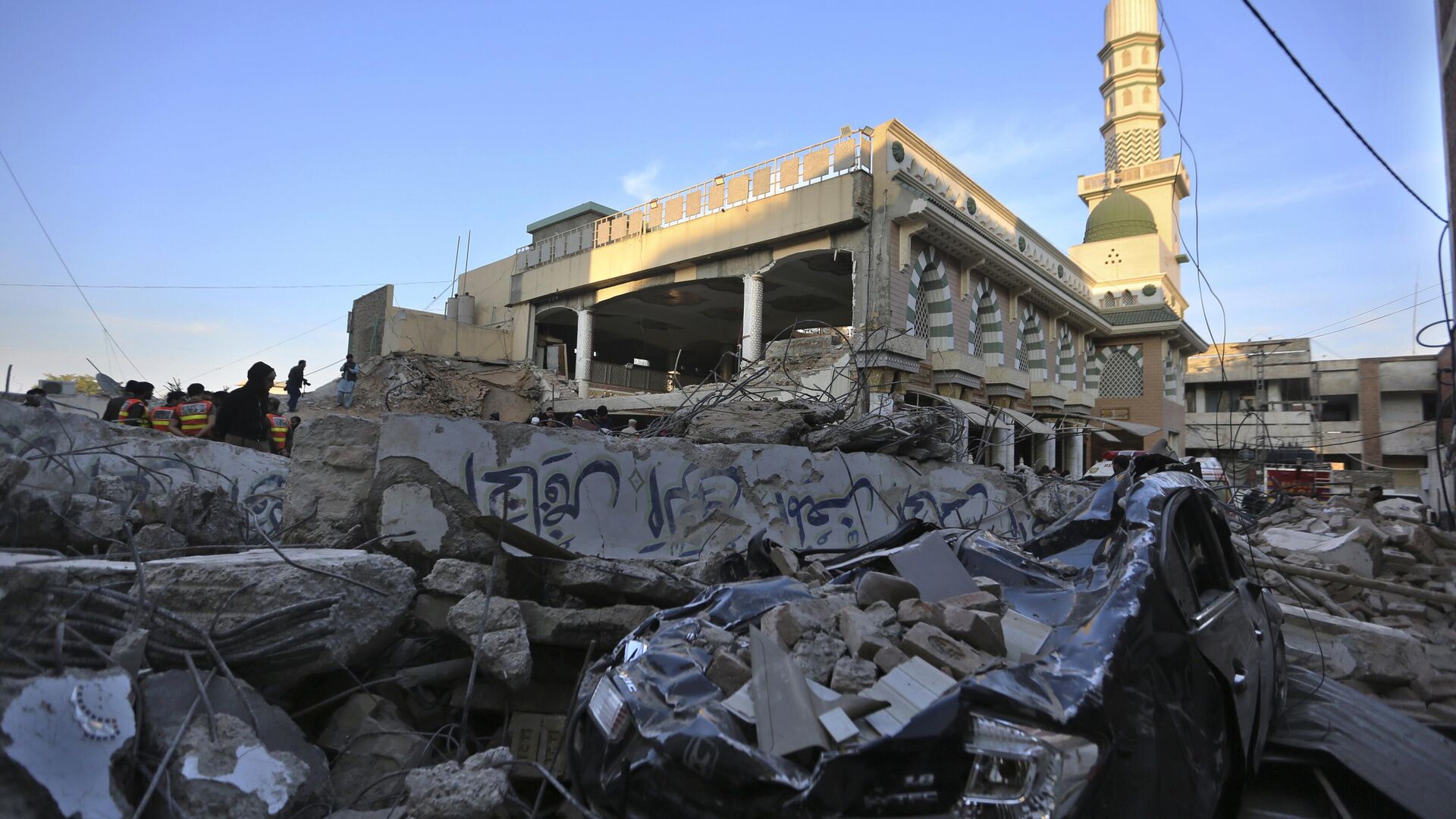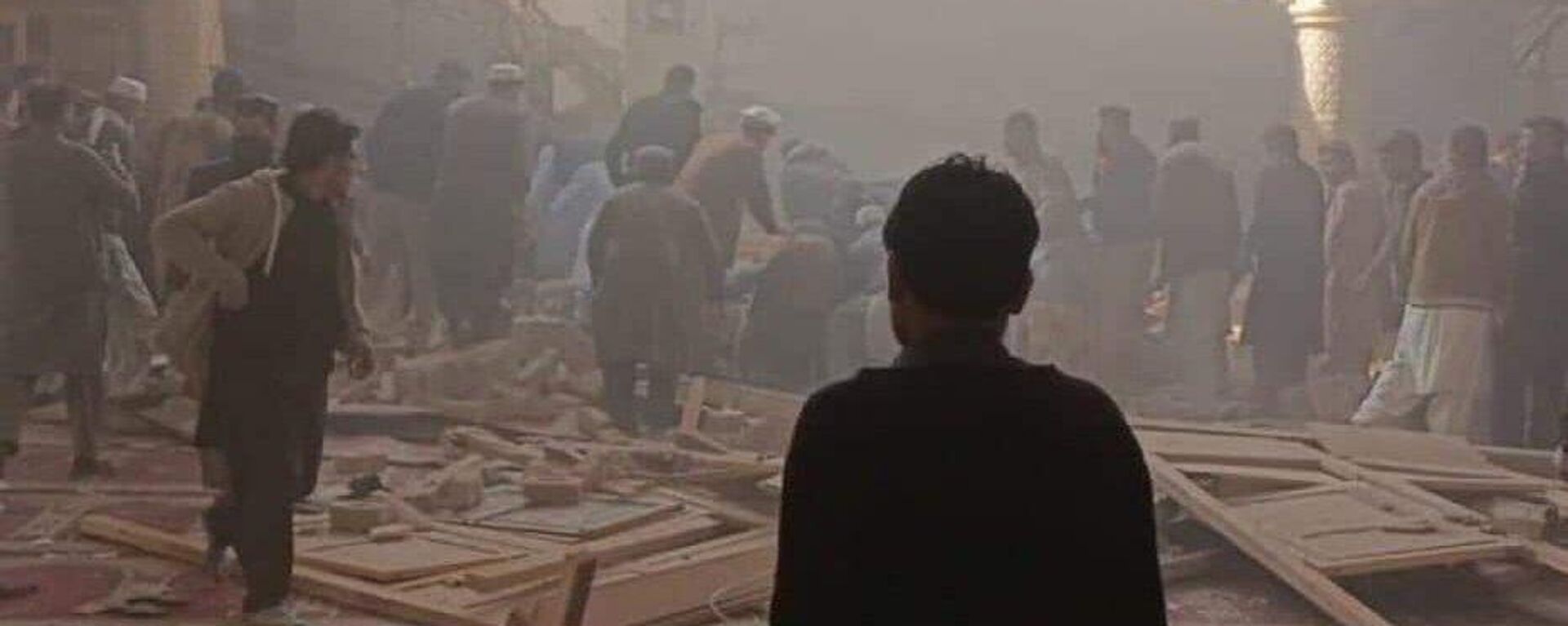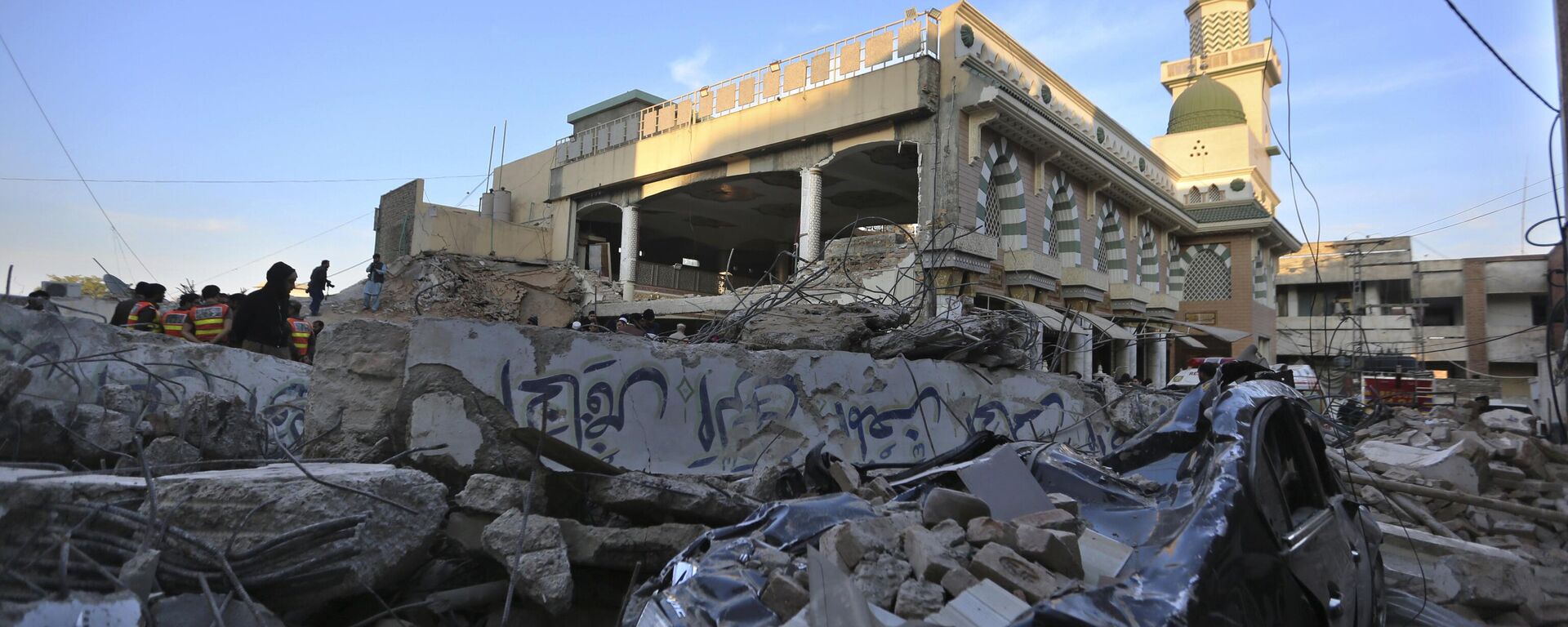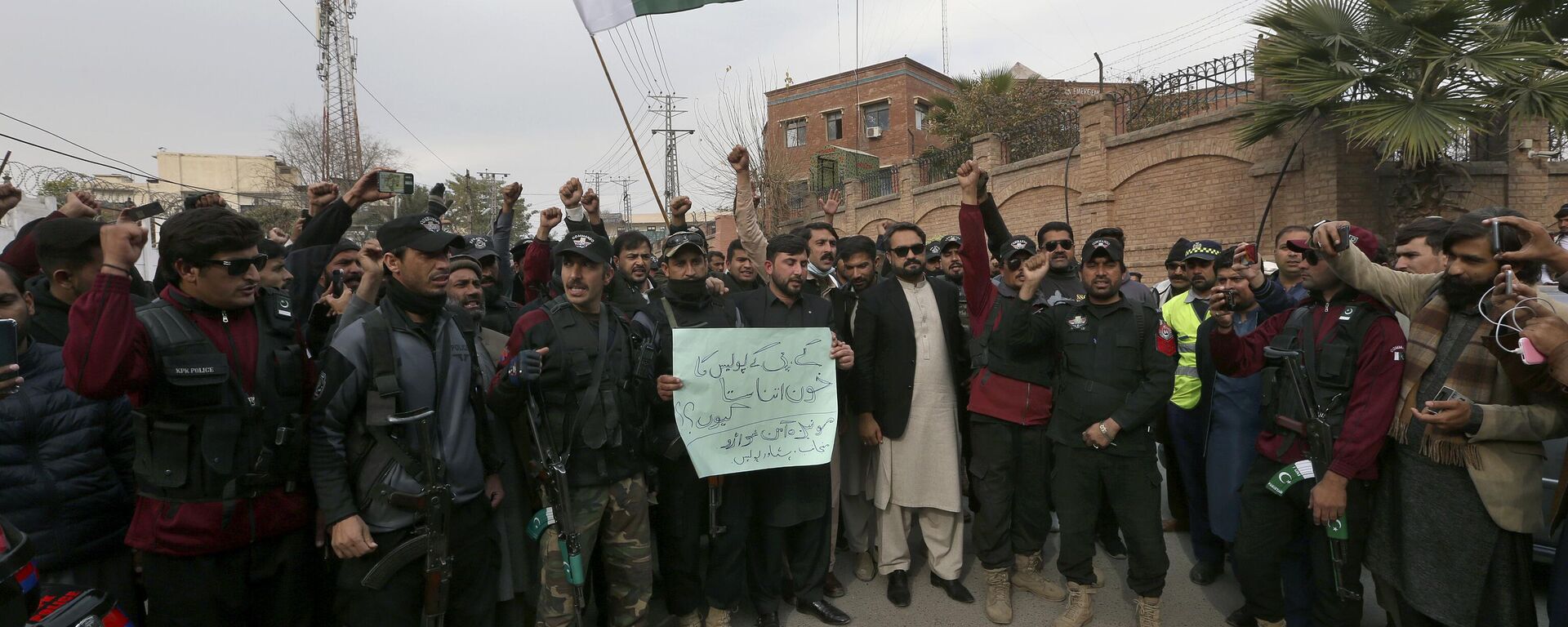https://sputniknews.in/20230208/is-there-a-coherent-strategy-to-combat-resurgent-forces-of-terror-in-pakistan-804449.html
Is There a Coherent Strategy to Combat Resurgent Forces of Terror in Pakistan?
Is There a Coherent Strategy to Combat Resurgent Forces of Terror in Pakistan?
Sputnik India
January 2023 was the deadliest month for Pakistan since July 2018 as the country faced a renewed wave of terrorism. 08.02.2023, Sputnik India
2023-02-08T19:03+0530
2023-02-08T19:03+0530
2023-02-08T19:47+0530
pakistan
militants
tehreek-e-taliban pakistan (ttp)
taliban
afghanistan
security breach
terrorist attack
terror outfits
terrorism
cross-border terrorism
https://cdn1.img.sputniknews.in/img/07e7/02/01/716126_0:160:3073:1888_1920x0_80_0_0_54a2930e11bfd3018f07d4303d87bb71.jpg
The Tehreek-i-Taliban Pakistan (TTP)* has claimed responsibility for major terrorist strikes as the country's leadership is trying to bridge the political divide over how to deal with the rising threat.There were at least 44 militant attacks across the country in January with 134 people losing their lives, according to statistics released by the Pakistan Institute for Conflict and Security Studies (PICSS). Over 250 civilians had sustained heavy injuries as the country witnessed a 139% spike in terrorist attacks.Rise of Violent ExtremismThe worst attack was on the mosque in Peshawar in the heavily guarded area called Peshawar Police Lines on January 30th. The suicide blast killed 101 worshippers, including 59 policemen. More than 150 people sustained heavy injuries and were hospitalized.The suicide bombing was carried out by a man who wore a police uniform as a disguise to enter the heavily guarded zone.As Pakistan officials suggested the attack emanated from Afghanistan, the Taliban** in Kabul were quick to dismiss the allegations.The outlawed Tehreek-i-Taliban Pakistan (TTP) claimed responsibility for the attack. It later distanced itself from the statement, but sources earlier suggested that it might have been the handiwork of some local faction of the outlawed group such as Jamaatul Ahrar.Jamaatul Ahrar had been involved with TTP to some extent but for some time, after the death of Omar Khalid Khorasani, they allegedly split up.Meanwhile, Pakistan's security forces stopped a number of other attacks by arresting at least 52 suspected militants, mainly from Punjab, and killing 40 suspects, mostly in Khyber Pakhtunkhwa, as reported by newspaper Dawn.Pakistan's northern province of Khyber Pakhtunkhwa (KP) has seen a dramatic increase in terror attacks and deaths of civilians as militancy is at its highest in the province.Inside the KP province, Lakki Marwat was one the most troubled districts, in January followed by DI Khan and Peshawar. The regions of Bannu, Charsadda, and Swabi also reported militant attacks over the month. All these regions are located at a close proximity to the Afghanistan border.Meanwhile, in Balochistan province nine militant attacks were reported, whereas in Punjab four attacks were reported in January. In the province of Sindh there were two reported militant attacks.The most high-profile attack was carried out in Mianwali’s Makerwal police station by around two dozen TTP militants on January 31.According to reports, the officers inside the police station were first attacked by militants at around 9 p.m. When the militants sprayed the station with automatic rifles, the cops retaliated with heavy gunfire and the exchange lasted two hours.The attack was repulsed, but it demonstrated the numerical strength and capability of the militants to mobilize armed militants across the KP and Punjab border.TTP's Rehabilitation Amid Political BattlesThe statistics point to the fact that there is a serious terrorism threat to Pakistan. Through their despicable actions, terrorists want to spread fear and paranoia among the masses and reverse the country's hard-earned gains against militancy.After the US exit and Taliban coming to power in Afghanistan in 2021, Pakistan witnessed a spike in terrorist attacks.When the Taliban returned to Afghanistan, some thousands of people with weapons were allowed to enter Pakistan through the Afghan border. At that time it was said that they are "good" Taliban and they will work according to the law and Constitution and that they will be rehabilitated.Clearly the "rehabilitation policy" toward the militants is not working.Meanwhile, Prime Minister Sharif urged all political parties in the country to come together to forge a united front against terrorism in Pakistan.However, this did not go down well with the ousted premier Imran Khan who lashed out on Sharif for allowing terrorism to spread in the country.Is There a Plan?The All Parties Conference (APC) called by the incumbent government to discuss important security and economic challenges being faced by Pakistan is a step toward a joint national plan to tackle the rising threat of militancy. However, the conference keeps getting postponed as it was postponed for the second time this week.Information Minister Marriyum Aurangzeb had rescheduled the conference to Feb 9, but just one day before the conference she said that the meeting has been once again postponed as Prime Minister Shehbaz Sharif is going to Turkey to express his condolences to the Turkish president following the devastating earthquakes.The new date for the APC meeting is yet to be announced.Some analysts, however, feel that a comprehensive counterterrorism policy cannot be made at multi party meetings.Furthermore, there is a lack of proper mechanism in place to implement the measures of counter terrorism because police and other civilian law-enforcement agencies, which are supposed to be on the frontlines of the fight against militancy, lack resources and capacity.Unfortunately, Pakistan's National Counter-Terrorism Authority (NACTA) has also been criticized for lacking a comprehensive plan to help in coordination among various intelligence and law-enforcement agencies.Some analysts feel that Shehbaz Sharif’s government in Pakistan is "engrossed" in dealing with a worsening financial crisis besides being targeted by political rival Imran Khan, thus emboldening the TTP leadership to launch attacks on the country.Moreover, the political instability that has engulfed Pakistan has further unleashed the TTP’s terror, as the group is playing it to its strategic advantage.It is obvious that extremism is a complex phenomenon that requires a thorough and multidisciplinary approach to understand and address.The military operations to root out violent extremism must be accompanied by comprehensive plans to eradicate militancy in all its aspects. These plans must not change each time a new political party comes to power. National security apparatus must be strong and should have enough financing to operate at its full capacity.If Pakistan managed to tackle the militancy issue before, with the right leadership and a proper national security plan, it can hopefully do it again, before more innocent lives are lost.*banned in Russia and many other states
https://sputniknews.in/20230131/death-toll-from-explosion-in-mosque-in-pakistans-peshawar-rises-to-90-reports-701035.html
https://sputniknews.in/20230201/day-after-peshawar-suicide-bombing-militants-attack-police-station-in-punjab-pakistan-714964.html
https://sputniknews.in/20230201/pakistani-police-investigating-security-breach-leading-to-peshawar-terrorist-attack-720845.html
https://sputniknews.in/20230208/pakistan-army-forces-eliminate-12-ttp-militants-in-week-long-operation-798554.html
pakistan
afghanistan
Sputnik India
feedback.hindi@sputniknews.com
+74956456601
MIA „Rossiya Segodnya“
2023
Aneela Rashid
https://cdn1.img.sputniknews.in/img/07e6/0c/0d/74548_0:0:485:484_100x100_80_0_0_821526e967ae85d041e2d30ee34fa1de.jpg
Aneela Rashid
https://cdn1.img.sputniknews.in/img/07e6/0c/0d/74548_0:0:485:484_100x100_80_0_0_821526e967ae85d041e2d30ee34fa1de.jpg
News
en_IN
Sputnik India
feedback.hindi@sputniknews.com
+74956456601
MIA „Rossiya Segodnya“
Sputnik India
feedback.hindi@sputniknews.com
+74956456601
MIA „Rossiya Segodnya“
Aneela Rashid
https://cdn1.img.sputniknews.in/img/07e6/0c/0d/74548_0:0:485:484_100x100_80_0_0_821526e967ae85d041e2d30ee34fa1de.jpg
pakistan, militants, tehreek-e-taliban pakistan (ttp), taliban, afghanistan, security breach, terrorist attack, terror outfits, terrorism, cross-border terrorism
pakistan, militants, tehreek-e-taliban pakistan (ttp), taliban, afghanistan, security breach, terrorist attack, terror outfits, terrorism, cross-border terrorism
Is There a Coherent Strategy to Combat Resurgent Forces of Terror in Pakistan?
19:03 08.02.2023 (Updated: 19:47 08.02.2023) January 2023 was the deadliest month for Pakistan since July 2018 as the country faced a renewed wave of terrorism.
The Tehreek-i-Taliban Pakistan (TTP)* has claimed responsibility for major terrorist strikes as the country's leadership is trying to bridge the political divide over how to deal with the rising threat.
There were at least 44 militant attacks across the country in January with 134 people losing their lives, according to statistics released by the Pakistan Institute for Conflict and Security Studies (PICSS). Over 250 civilians had sustained heavy injuries as the country witnessed a 139% spike in terrorist attacks.
Rise of Violent Extremism
The worst attack was on the mosque in Peshawar in the heavily guarded area called Peshawar Police Lines on January 30th. The suicide blast killed 101 worshippers, including 59 policemen. More than 150 people sustained heavy injuries and were hospitalized.
The suicide bombing was carried out by a man who wore a police uniform as a disguise to enter the heavily guarded zone.
As Pakistan officials suggested the attack emanated from Afghanistan, the Taliban** in Kabul were quick to dismiss the allegations.
The outlawed Tehreek-i-Taliban Pakistan (TTP) claimed responsibility for the attack. It later distanced itself from the statement, but sources earlier suggested that it might have been the handiwork of some local faction of the outlawed group such as Jamaatul Ahrar.
Jamaatul Ahrar had been involved with TTP to some extent but for some time, after the death of Omar Khalid Khorasani, they allegedly split up.
Meanwhile, Pakistan's security forces stopped a number of other attacks by arresting at least 52 suspected militants, mainly from Punjab, and killing 40 suspects, mostly in Khyber Pakhtunkhwa, as
reported by newspaper Dawn.
Pakistan's northern province of Khyber Pakhtunkhwa (KP) has seen a dramatic increase in terror attacks and deaths of civilians as militancy is at its highest in the province.
Inside the KP province, Lakki Marwat was one the most troubled districts, in January followed by DI Khan and Peshawar. The regions of Bannu, Charsadda, and Swabi also reported militant attacks over the month. All these regions are located at a close proximity to the Afghanistan border.
Meanwhile, in Balochistan province nine militant attacks were reported, whereas in Punjab four attacks were reported in January. In the province of Sindh there were two reported militant attacks.
The most high-profile attack was carried out in Mianwali’s Makerwal police station by around two dozen TTP militants on January 31.
According to reports, the officers inside the police station were first attacked by militants at around 9 p.m. When the militants sprayed the station with automatic rifles, the cops retaliated with heavy gunfire and the exchange lasted two hours.
The attack was repulsed, but it demonstrated the numerical strength and capability of the militants to mobilize armed militants across the KP and Punjab border.
TTP's Rehabilitation Amid Political Battles
The statistics point to the fact that there is a serious terrorism threat to Pakistan. Through their despicable actions, terrorists want to spread fear and paranoia among the masses and reverse the country's hard-earned gains against militancy.
After the US exit and Taliban coming to power in Afghanistan in 2021, Pakistan witnessed a spike in terrorist attacks.
When the Taliban returned to Afghanistan, some thousands of people with weapons were allowed to enter Pakistan through the Afghan border. At that time it was said that they are "good" Taliban and they will work according to the law and Constitution and that they will be rehabilitated.
Clearly the "rehabilitation policy" toward the militants is not working.
PPP Senator Raza Rabbani in his parliamentary address following the Peshawar bombing said, "The TTP’s rehabilitation policy, which was initiated by the [previous] government, is the foundation of this. Parliament had said that a joint session should be called and all these things should be presented before it so that the public’s opinion could be brought forward."
Meanwhile, Prime Minister Sharif urged all political parties in the country to come together to forge a united front against terrorism in Pakistan.
However, this did not go down well with the ousted premier Imran Khan who lashed out on Sharif for allowing terrorism to spread in the country.
"How can Shehbaz Sharif be so shameless, given his government's destruction in 10 months of our economy and democracy with brazen fascism, end of fundamental rights and rule of law; and allowing terrorism to spread under his watch?" Khan tweeted.
The All Parties Conference (APC) called by the incumbent government to discuss important security and economic challenges being faced by Pakistan is a step toward a joint national plan to tackle the rising threat of militancy.
However, the conference keeps getting postponed as it was postponed for the second time this week.
Information Minister Marriyum Aurangzeb had rescheduled the conference to Feb 9, but just one day before the conference she said that the meeting has been once again postponed as Prime Minister Shehbaz Sharif is going to Turkey to express his condolences to the Turkish president following the devastating earthquakes.
The new date for the APC meeting is yet to be announced.
Some analysts, however, feel that a comprehensive counterterrorism policy cannot be made at multi party meetings.
"There is not much hope that political parties with such diverse views on the very meaning of militancy and violent extremism can come up with a comprehensive plan of action. This ambiguity has harmed our national security more than anything else, and once again, turned the country into a killing field for terrorists," according to an analysis by Zahid Hussain.
Furthermore, there is a lack of proper mechanism in place to implement the measures of counter terrorism because police and other civilian law-enforcement agencies, which are supposed to be on the frontlines of the fight against militancy, lack resources and capacity.
Unfortunately, Pakistan's National Counter-Terrorism Authority (NACTA) has also been criticized for lacking a comprehensive plan to help in coordination among various intelligence and law-enforcement agencies.
Some analysts feel that Shehbaz Sharif’s government in Pakistan is "engrossed" in dealing with a worsening financial crisis besides being targeted by political rival Imran Khan, thus emboldening the TTP leadership to launch attacks on the country.
Moreover, the political instability that has engulfed Pakistan has further unleashed the TTP’s terror, as the group is playing it to its strategic advantage.
It is obvious that extremism is a complex phenomenon that requires a thorough and multidisciplinary approach to understand and address.
The military operations to root out violent extremism must be accompanied by comprehensive plans to eradicate militancy in all its aspects. These plans must not change each time a new political party comes to power. National security apparatus must be strong and should have enough financing to operate at its full capacity.
If Pakistan managed to tackle the militancy issue before, with the right leadership and a proper national security plan, it can hopefully do it again, before more innocent lives are lost.
*banned in Russia and many other states






